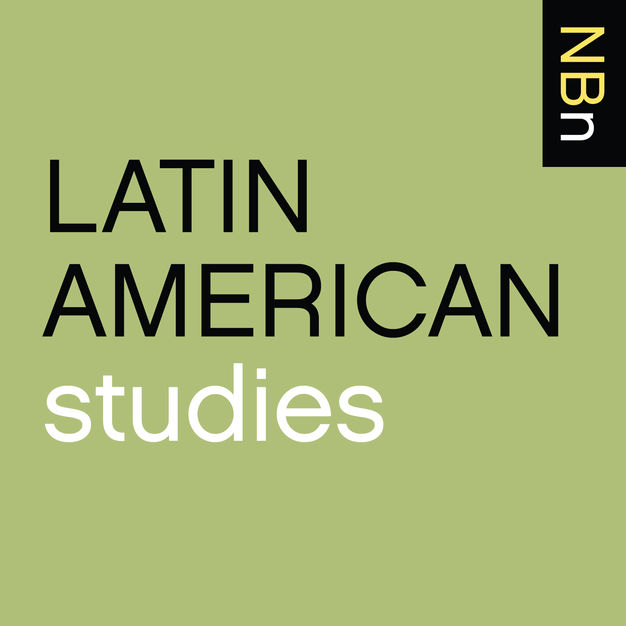
New Books in Latin American Studies
Interview with Scholars of Latin America about their New Books
- 34 minutes 39 secondsGreg Childs on Seditious Conspiracy (EF, JP)
What a difference four years makes. Back in February 2021, still struggling to understand what had just happened at the Capitol, John and Elizabeth spoke with Brandeis historian Greg Childs. He is an expert in Latin American political movements and public space; his Seditious Spaces: Race, Freedom, and the 1798 Conspiracy in Bahia, Brazil is imminently forthcoming from Cambridge UP.
Greg's historical and hemispheric perspective helped bring out the differences between calling an event “sedition,” “seditious conspiracy” and “insurrection,” the new “Lost Cause” that many of those attacking the Capitol seem to hold on to and the particularities of Whiteness in the United States, as compared to elsewhere in the Americas. Greg even proposes a new word for what happened January 6th, 2021: counterinsurgency.
Mentioned in this episode:
- Legitimation Crisis (1974), Jurgen Habermas
- On Revolution (1963), Hannah Arendt
- The Machiavellian Moment (1975), J. G. A. Pocock
- Closer to Freedom: Enslaved Women and Everyday Resistance in the Plantation South (2004), Stephanie Camp
- Popular Contention in Great Britain, 1758-1834 (1998), Charles Tilly
- The Possessive Investment of Whiteness: How White People Profit from Identity Politics (orig. 1998) 20th anniversary edition, George Lipsitz
Listen and Read.
Learn more about your ad choices. Visit megaphone.fm/adchoices
Support our show by becoming a premium member! https://newbooksnetwork.supportingcast.fm/latin-american-studies
23 January 2025, 9:00 am - 41 minutes 19 secondsCarol Cleaveland and Michele Waslin. "Private Violence: Latin American Women and the Struggle for Asylum" (NYU Press, 2024)
How the US asylum process fails to protect against claims of gender-based violence.
Through eyewitness accounts of closed-court proceedings and powerful testimony from women who have sought asylum in the United States because of severe assaults and death threats by intimate partners and/or gang members, Private Violence: Latin American Women and the Struggle for Asylum (NYU Press, 2024) examines how immigration laws and policies shape the lives of Latin American women who seek safety in the United States. Carol Cleaveland and Michele Waslin describe the women's histories prior to crossing the border, and the legal strategies they use to convince Immigration Judges that rape and other forms of "private violence" should merit asylum - despite laws built on Cold War era assumptions that persecution occurs in the public sphere by state actors.
Private Violence provides much-needed recommendations for incorporating a gender-based lens in the asylum process. The authors demonstrate how policy changes across Presidential administrations have made it difficult for survivors of "private violence" to qualify for asylum. Private Violence paints a damning portrait of America's broken asylum system. This volume illustrates the difficulties experienced by Latin American women who rely on this broken system for protection in the United States. It also illuminates women's resilience and the determination of immigration attorneys to reshape asylum law.
Learn more about your ad choices. Visit megaphone.fm/adchoices
Support our show by becoming a premium member! https://newbooksnetwork.supportingcast.fm/latin-american-studies
20 January 2025, 9:00 am - 43 minutes 45 secondsAndrew Laird, "Aztec Latin: Renaissance Learning and Nahuatl Traditions in Early Colonial Mexico" (Oxford UP, 2024)
Andrew Laird, of Brown University, discusses Aztec Latin: Renaissance Learning and Nahuatl Traditions in Early Colonial Mexico (Oxford University Press, 2024). In 1536, only fifteen years after the fall of the Aztec empire, Franciscan missionaries began teaching Latin, classical rhetoric, and Aristotelian philosophy to native youths in central Mexico. The remarkable linguistic and cultural exchanges that would result from that initiative are the subject of this book. Aztec Latin highlights the importance of Renaissance humanist education for early colonial indigenous history, showing how practices central to humanism — the cultivation of eloquence, the training of leaders, scholarly translation, and antiquarian research — were transformed in New Spain to serve Indian elites as well as the Spanish authorities and religious orders.
While Franciscan friars, inspired by Erasmus' ideal of a common tongue, applied principles of Latin grammar to Amerindian languages, native scholars translated the Gospels, a range of devotional literature, and even Aesop's fables into the Mexican language of Nahuatl. They also produced significant new writings in Latin and Nahuatl, adorning accounts of their ancestral past with parallels from Greek and Roman history and importing themes from classical and Christian sources to interpret pre-Hispanic customs and beliefs. Aztec Latin reveals the full extent to which the first Mexican authors mastered and made use of European learning and provides a timely reassessment of what those indigenous authors really achieved.
Learn more about your ad choices. Visit megaphone.fm/adchoices
Support our show by becoming a premium member! https://newbooksnetwork.supportingcast.fm/latin-american-studies
18 January 2025, 9:00 am - 52 minutes 27 secondsByron Ellsworth Hamann, "The Invention of the Colonial Americas: Data, Architecture, and the Archive of the Indies, 1781–1844" (Getty, 2022)
The Invention of the Colonial Americas: Data, Architecture, and the Archive of the Indies, 1781–1844 (Getty, 2022) is an architectural history and media-archaeological study of changing theories and practices of government archives in Enlightenment Spain. It centers on an archive created in Seville for storing Spain's pre-1760 documents about the New World. To fill this new archive, older archives elsewhere in Spain--spaces in which records about American history were stored together with records about European history--were dismembered. The Archive of the Indies thus constructed a scholarly apparatus that made it easier to imagine the history of the Americas as independent from the history of Europe, and vice versa.
In this meticulously researched book, Byron Ellsworth Hamann explores how building layouts, systems of storage, and the arrangement of documents were designed to foster the creation of new knowledge. He draws on a rich collection of eighteenth-century architectural plans, descriptions, models, document catalogs, and surviving buildings to present a literal, materially precise account of archives as assemblages of spaces, humans, and data--assemblages that were understood circa 1800 as capable of actively generating scholarly innovation.
Learn more about your ad choices. Visit megaphone.fm/adchoices
Support our show by becoming a premium member! https://newbooksnetwork.supportingcast.fm/latin-american-studies
18 January 2025, 9:00 am - 1 hour 21 minutesVictor M. Valle, "The Poetics of Fire: Metaphors of Chile Eating in the Borderlands" (U New Mexico Press, 2023)
Chile is more than just spice, writes Pulitzer prize-winning journalist and Cal Poly Ethnic Studies professor Victor Valle in The Poetics of Fire: Metaphors of Chile Eating in the Borderlands (U New Mexico Press, 2023). By tracing the meaning of chile as a plant and chile eating as an act. Valle shows how Indigenous cultivation and culinary practices troubled colonizers, sustained cultures, and fostered exchange. The Poetics of Fire calls for decolonization of chile cultivation and a renewed embrace of Indigenous ideals toward land and nourishment, arguing that chiles serve as a connection point between pre-colonization Indigenous societies and twentieth century (and beyond) Chicanx and Latinx communities. At once food studies, Indigenous studies, and Latinx studies, The Poetics of Fire dispenses with Scoville units and instead thinks about how chile is a window for understanding a decolonized world.
Learn more about your ad choices. Visit megaphone.fm/adchoices
Support our show by becoming a premium member! https://newbooksnetwork.supportingcast.fm/latin-american-studies
17 January 2025, 9:00 am - 46 minutes 17 secondsAndrew Gomez, "Constructing Cuban America: Race and Identity in Florida's Caribbean South, 1868–1945" (U Texas Press, 2024)
How Black and white Cubans navigated issues of race, politics, and identity during the post-Civil War and early Jim Crow eras in South Florida.
On July 4, 1876, during the centennial celebration of US independence, the city of Key West was different from other cities. In some of post–Civil War Florida, Black residents were hindered from participating in 4th of July festivities, but Key West's celebration, “led by a Cuban revolutionary mayor working in concert with a city council composed of Afro-Bahamians, Cubans, African Americans, and Anglos,” represented a profound exercise in interracial democracy amid the Radical Reconstruction era.
Constructing Cuban America: Race and Identity in Florida's Caribbean South, 1868–1945 (U Texas Press, 2024) examines the first Cuban American communities in South Florida—Key West and Tampa—and how race played a central role in shaping the experiences of white and Black Cubans. Andrew Gomez argues that factors such as the Cuban independence movement and Radical Reconstruction produced interracial communities of Cubans that worked alongside African Americans and Afro-Bahamians in Florida, yielding several successes in interracial democratic representation, even as they continued to wrestle with elements of racial separatism within the Cuban community. But the conclusion of the Cuban War of Independence and early Jim Crow laws led to a fracture in the Cuban-American community. In the process, both Black and white Cubans posited distinct visions of Cuban-American identity.
Andrew Gomez is an associate professor of history at the University of Puget Sound.
Katie Coldiron is the Outreach Program Manager for the Digital Library of the Caribbean (dLOC) and PhD student in History at Florida International University.
Learn more about your ad choices. Visit megaphone.fm/adchoices
Support our show by becoming a premium member! https://newbooksnetwork.supportingcast.fm/latin-american-studies
13 January 2025, 9:00 am - 51 minutes 47 secondsBenjamin H. Bradlow, "Urban Power: Democracy and Inequality in São Paulo and Johannesburg" (Princeton UP, 2024)
Why some cities are more effective than others at reducing inequalities in the built environment.
For the first time in history, most people live in cities. One in seven are living in slums, the most excluded parts of cities, in which the basics of urban life—including adequate housing, accessible sanitation, and reliable transportation—are largely unavailable. Why are some cities more successful than others in reducing inequalities in the built environment?
In Urban Power: Democracy and Inequality in São Paulo and Johannesburg (Princeton UP, 2024), Benjamin Bradlow explores this question, examining the effectiveness of urban governance in two “megacities” in young democracies: São Paulo, Brazil, and Johannesburg, South Africa. Both cities came out of periods of authoritarian rule with similarly high inequalities and similar policy priorities to lower them. And yet São Paulo has been far more successful than Johannesburg in improving access to basic urban goods.
Bradlow examines the relationships between local government bureaucracies and urban social movements that have shaped these outcomes. Drawing on sixteen months of fieldwork in both cities, including interviews with informants from government agencies, political leadership, social movements, private developers, bus companies, and water and sanitation companies, Bradlow details the political and professional conflicts between and within movements, governments, private corporations, and political parties. He proposes a bold theoretical approach for a new global urban sociology that focuses on variations in the coordination of local governing power, arguing that the concepts of “embeddedness” and “cohesion” explain processes of change that bridge external social mobilization and the internal coordinating capacity of local government to implement policy changes.
Learn more about your ad choices. Visit megaphone.fm/adchoices
Support our show by becoming a premium member! https://newbooksnetwork.supportingcast.fm/latin-american-studies
13 January 2025, 9:00 am - 1 hour 25 minutesJorge Duany, "Puerto Rico: What Everyone Needs to Know" (Oxford UP, 2024)
In the second edition of Puerto Rico: What Everyone Needs to Know (Oxford UP, 2024), Jorge Duany unravels the fascinating and turbulent past and present of an island that is politically and economically tied to the United States, yet culturally distinct.
Acquired by the United States from Spain in 1898, Puerto Rico has a peculiar status among Latin American and Caribbean countries. As a US Commonwealth, the island enjoys limited autonomy over local matters, but the US has dominated it militarily, politically, and economically for much of its recent history. Though they are US citizens, Puerto Ricans do not have their own voting representatives in Congress and cannot vote in presidential elections (although they are able to participate in the primaries). In recent years, Puerto Rico's colossal public debt sparked an economic crisis that catapulted it onto the national stage and intensified the exodus to the US, bringing to the fore many of the unresolved remnants of its colonial history.
In the second edition of Puerto Rico: What Everyone Needs to Know®, Jorge Duany provides a succinct, authoritative introduction to the island's rich history, culture, politics, and economy, as well as its diaspora. Beginning with a historical overview of Puerto Rico, Duany covers the Spanish colonial period (1493-1898) and the first five decades of the US colonial regime. He then delves into the demographic, economic, political, and cultural features of contemporary Puerto Rico--the inner workings of the Commonwealth government and the island's relationship to the United States. Moreover, the book explores the massive population displacement that has characterized Puerto Rico since the mid-twentieth century. New material examines the multiple issues affecting Puerto Rico in the last decade, including a prolonged recession, the devastating impact of two hurricanes, and the largest migrant wave ever recorded from Puerto Rico.
While a popular tourist destination, few beyond Puerto Rico's shores are familiar with its complex history and diverse culture. Duany takes on the task of educating readers on the most important facets of the unique, troubled, but much beloved isla del encanto.
Jorge Duany is the recently retired Professor of Global and Sociocultural Studies and Director of the Cuban Research Institute at Florida International University.
Katie Coldiron is the Outreach Program Manager for the Digital Library of the Caribbean (dLOC) and PhD student in History at Florida International University.
Learn more about your ad choices. Visit megaphone.fm/adchoices
Support our show by becoming a premium member! https://newbooksnetwork.supportingcast.fm/latin-american-studies
12 January 2025, 9:00 am - 48 minutes 25 secondsEdward Jones Corredera, "Odious Debt: Bankruptcy, International Law, and the Making of Latin America" (Oxford UP, 2024)
What are fallen tyrants owed? What makes debt illegitimate? And when is bankruptcy moral? Drawing on new archival sources, this book shows how Latin American nations have wrestled with the morality of indebtedness and insolvency since their foundation, and outlines how their history can shed new light on contemporary global dilemmas.
With a focus on the early modern Spanish Empire and modern Mexico, Colombia, and Argentina, and based on archival research carried out across seven countries, Odious Debt: Bankruptcy, International Law, and the Making of Latin America (Oxford University Press, 2024) by Dr. Edward Jones Corredera studies 400 years of history and unearths overlooked congressional debates and understudied thinkers. The book shows how discussions on the morality of debt and default played a structuring role in the construction and codification of national constitutions, identities, and international legal norms in Latin America.
This new history of the moral economy of the Hispanic World from the 1520s to the 1920s illuminates contemporary issues in international law and international relations. Latin American jurists developed a global critique of economics and international law that continues to generate pressing questions about debt, bankruptcy, reparations, and the pursuit of a moral global economy.
This interview was conducted by Dr. Miranda Melcher whose new book focuses on post-conflict military integration, understanding treaty negotiation and implementation in civil war contexts, with qualitative analysis of the Angolan and Mozambican civil wars.
Learn more about your ad choices. Visit megaphone.fm/adchoices
Support our show by becoming a premium member! https://newbooksnetwork.supportingcast.fm/latin-american-studies
10 January 2025, 9:00 am - 29 minutes 10 secondsAlex Cuadros, "When We Sold God's Eye: Diamonds, Murder, and a Clash of Worlds in the Amazon" (Grand Central Publishing, 2024)
Growing up in a remote corner of the world’s largest rainforest, Pio, Maria, and Oita learned to hunt wild pigs and tapirs, and gathered Brazil nuts and açaí berries from centuries-old trees. The first highway pierced through in 1960. Ranchers, loggers, and prospectors invaded, and the kids lost their families to terrible new weapons and diseases. Pushed by the government to assimilate, they struggled to figure out their new, capitalist reality, discovering its wonders—cars, refrigerators, TV sets, phones—as well as a way to acquire them: by selling the natural riches of their own forest home. They had to partner with the white men who’d hunted them, but their wealth grew legendary, the envy of the nation—until decades of suppressed trauma erupted into a massacre, bloody retribution that made headlines across the globe.
Based on six years of immersive reporting and research, When We Sold God's Eye: Diamonds, Murder, and a Clash of Worlds in the Amazon (Grand Central Publishing, 2024) tells a unique kind of adventure story, one that begins with a river journey by Theodore Roosevelt and ends with smugglers from New York City’s Diamond District. It’s a story of survival against all odds; of the temptations of wealth and the dream of prosperity; of an ecosystem threatened by our hunger for resources; of genocide and revenge. It’s a tragedy as old as the first European encounters with Indigenous people, playing out in the present day. But most of all, it’s the moving saga of a few audacious individuals—Pio, Maria, Oita, and their friends—and their attempts to adapt and even thrive in the most unlikely circumstances.
Learn more about your ad choices. Visit megaphone.fm/adchoices
Support our show by becoming a premium member! https://newbooksnetwork.supportingcast.fm/latin-american-studies
8 January 2025, 9:00 am - 44 minutes 22 secondsSimon Hall, "Ten Days in Harlem: Fidel Castro and the Making of the 1960s" (Faber and Faber, 2020)
In his new book Ten Days in Harlem: Fidel Castro and the Making of the 1960s (Faber, 2020), Simon Hall, a Professor of Modern History at the University of Leeds, colorfully details an extraordinary visit by Fidel Castro to New York in the Autumn of 1960 for the opening of the UN General Assembly.
Holding court from the iconic Hotel Theresa in Harlem, Castro's riotous stay in New York saw him connect with leaders from within the local African American community, as well as political and cultural luminaries such as Gamal Abdel Nasser, Nikita Khrushchev, Kwame Nkrumah and Allen Ginsberg. Through exploring the local and global impact of these ten days, Hall recovers Castro's visit as a critical turning point in the trajectory of the Cold War and the development of the 'The Sixties.'
E. James West is a Leverhulme Early Career Fellow in American History at Northumbria University. He is the author of Ebony Magazine and Lerone Bennett Jr.: Popular Black History in Postwar America (Illinois, 2020).
Learn more about your ad choices. Visit megaphone.fm/adchoices
Support our show by becoming a premium member! https://newbooksnetwork.supportingcast.fm/latin-american-studies
7 January 2025, 9:00 am - More Episodes? Get the App
Your feedback is valuable to us. Should you encounter any bugs, glitches, lack of functionality or other problems, please email us on [email protected] or join Moon.FM Telegram Group where you can talk directly to the dev team who are happy to answer any queries.
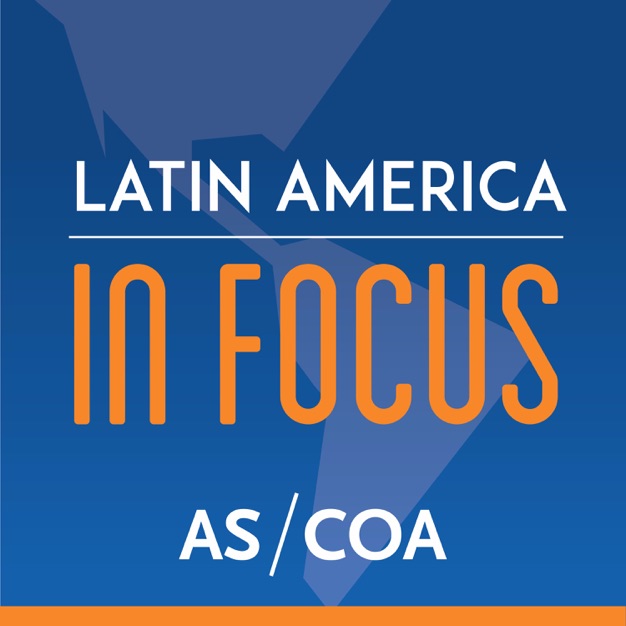 Latin America in Focus
Latin America in Focus
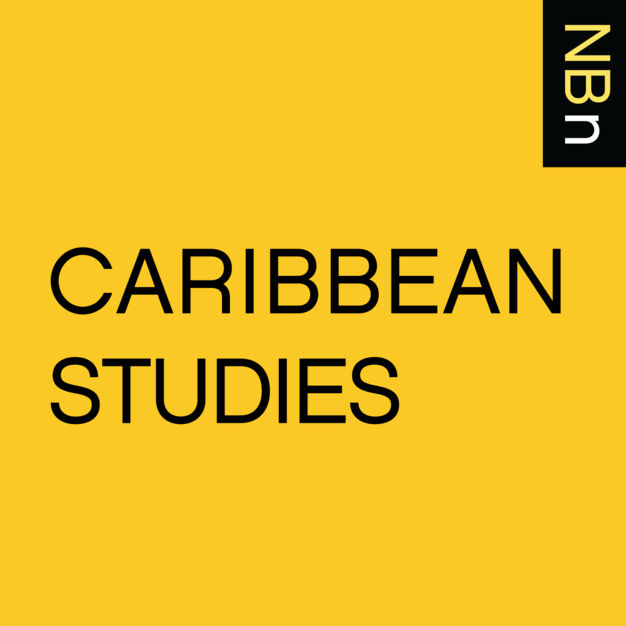 New Books in Caribbean Studies
New Books in Caribbean Studies
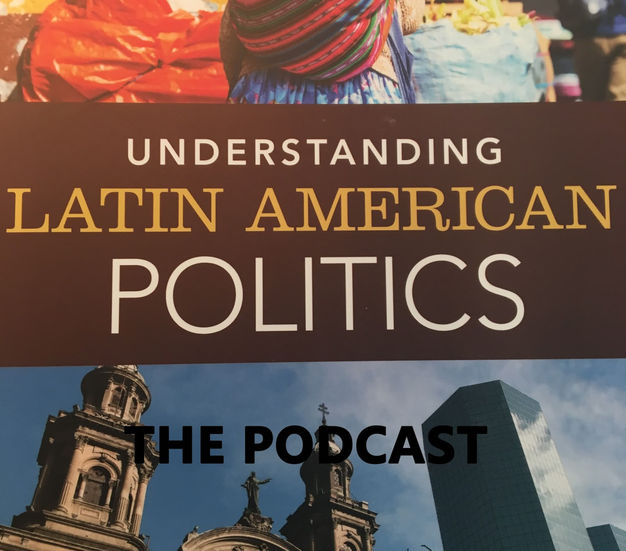 Understanding Latin American Politics: The Podcast
Understanding Latin American Politics: The Podcast
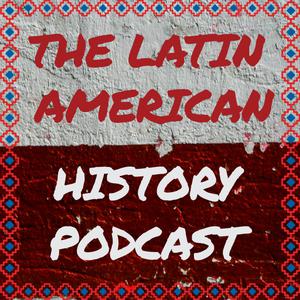 The Latin American History Podcast
The Latin American History Podcast
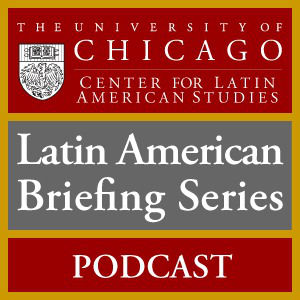 The Latin American Briefing Series
The Latin American Briefing Series
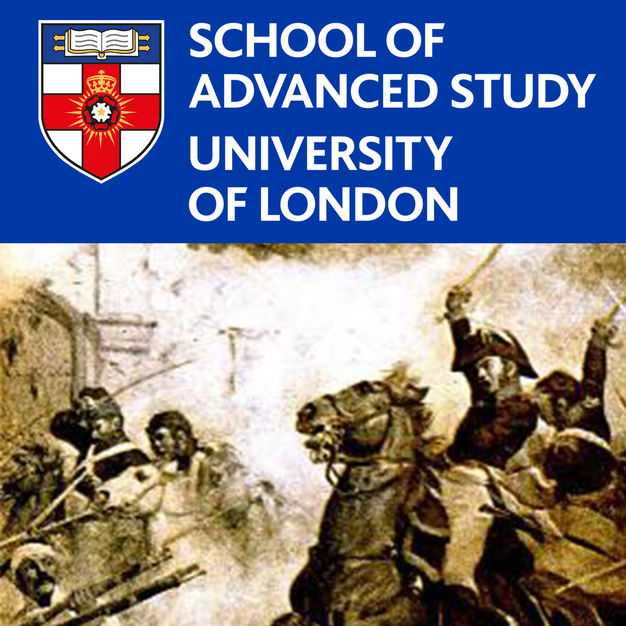 Latin American History Seminars
Latin American History Seminars